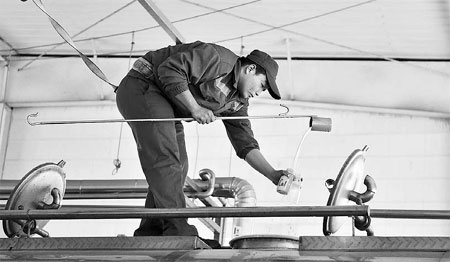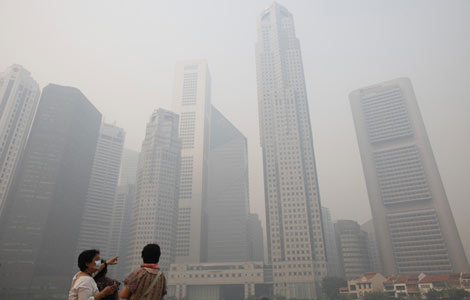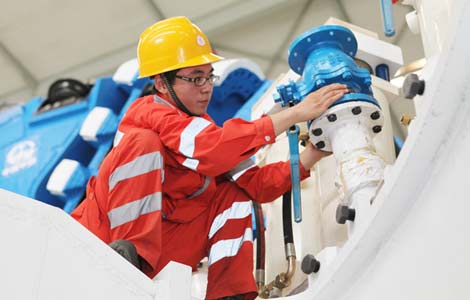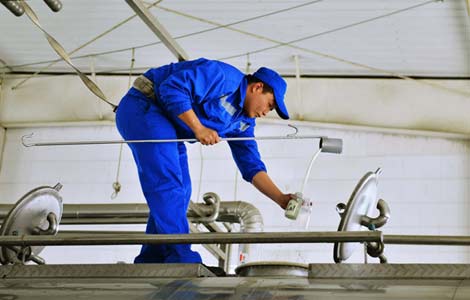Rising demand sends producers overseas
Updated: 2013-06-21 07:03
By Wang Xiaodong (China Daily)
|
||||||||
|
A staff member for a factory of the China Mengniu Dairy Co collects milk samples from a milk cart in Maanshan, Anhui province, in March for quality checks. Long Wei / for China Daily |
With increasing domestic demand for dairy both in quantity and quality, more companies are looking abroad for secure sources, a move hailed by industry insiders as a necessary step to increase competitiveness of China's dairy industry.
"Excellent dairy sources in New Zealand are a major incentive for us to invest there," Lin Jinlin, spokesman for Yashili International Holdings Ltd, told China Daily. "The project is expected to provide steady, high-quality products to our consumers."
The company merged with China Mengniu Dairy Co, the country's largest dairy producer, according to a joint announcement on Tuesday.
China Mengniu Dairy Co will acquire a more than 75 percent stake in Yashili after the merger.
The factory, being built in Waikato, New Zealand, with an investment of 1.1 billion yuan ($180 million), will produce 52,000 tons of milk powder annually, Lin said.
Yashili is one of the increasing number of dairy enterprises expanding production overseas to meet increasing demand from domestic consumers.
"Making use of international sources is a requirement for the development of our company. It can also increase the competitiveness of China's dairy industry", Lin said.
Yili, another major producer, announced in April that its New Zealand project, with an annual production capacity of 47,000 tons of baby formula, had been approved by both countries.
"The increasing consumption demand for dairy and the limited domestic supply has created a huge gap, which is a major reason producers are looking to the international market to secure sources," said Wang Dingmian, executive council member of the Dairy Association of China.
In 2012, total production of baby formula by domestic producers was 600,000 tons, and imported milk powder was about 90,000 tons, accounting for 15 percent of domestic production, said Teng Jiacai, deputy head of China Food and Drug Administration.
"Average consumption of dairy products in China was only 28 kg last year, far below many other countries," said Song Liang, a researcher on dairy industry at the Distribution Productivity Promotion Center of China Commerce. Due to limited sources and environmental pollution, the cost for raising cows has been increasing in recent years, which results in higher prices for milk, Song said.
For example, a kg of raw milk sells at about 3.4 yuan ($.55) in China, but at less than 3 yuan in Australia, he said.
"Besides, most raw milk in China is produced by small farms or individual farmers, making it hard to ensure high quality," he said.
Food safety is also a public concern, and milk scandals in recent years have greatly dampened consumers' confidence.
One incident, in which melamine, a poisonous chemical, was added to milk to make it seem rich in protein during quality tests, left 300,000 babies sick and caused six deaths nationwide in 2008.
The incident prompted government to take more strict measures in supervising the industry, including shutting down a number of factories and setting new standards.
According to a survey conducted by the General Administration of Quality Supervision, Inspection and Quarantine between 2011 and 2012, which sampled 128,240 batches of dairy products, 99.74 percent met the standards.
Despite progress, public confidence in domestic milk is still recovering. Sales of foreign-brand milk accounted for more than 85 percent of total milk-powder consumption in major cities, according to Wang.
"The biggest obstacle to China's dairy industry is the lack of trust from consumers," he said. "Restoring confidence is the most important thing the industry needs to do for its healthy development."
"Investing abroad reduce risks, compared with relying on import, which brings risks like price manipulation by sellers."
Using international sources can contribute to a healthy and sustainable development of China's dairy industry, and risks of operating in the international market are lower than any other time in history, he said.
wangxiaodong@chinadaily.com.cn
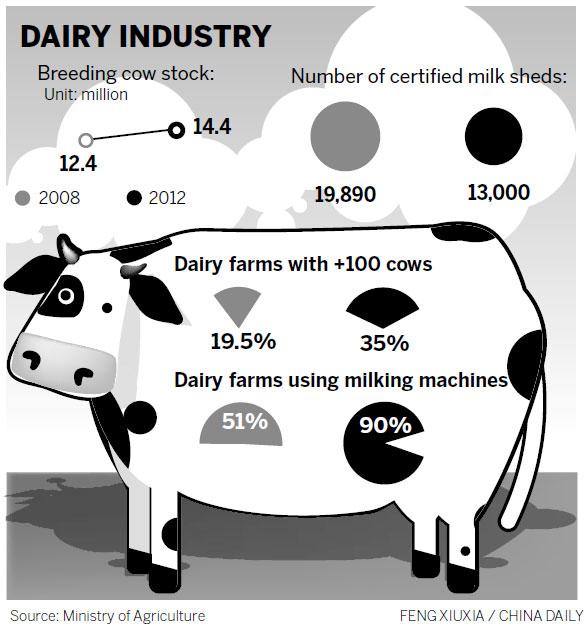
(China Daily USA 06/21/2013 page4)
Most Viewed
Editor's Picks

|

|

|

|

|

|
Today's Top News
China slams US human trafficking report
China urges resumption of six-party talks
SEC charges China-based firm with fraud
Bank of China denies monetary default report
Snowden's future hangs in balance
China reiterates support for the UN
Dairy measures start at source
June PMI signals weakness
US Weekly

|

|
